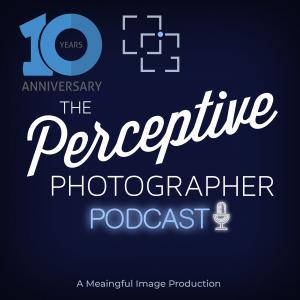The Perceptive Photographer

In Conversation with Ken Carlson: Curiosity, Craft, and the MFA Path
In the first episode of my new In Conversation series, I sit down with my friend and fellow photographer Ken Carlson to talk about his decision to pursue an MFA in photography. Ken’s path to grad school isn’t the usual one—and that’s exactly what makes his story so insightful. From a career in veterinary medicine to deep dives into critique and artistic voice, Ken brings a unique perspective to what it means to grow creatively, stay curious, and learn with intention.
We talk about a lot in this episode: mentorship, the benefits (and limits) of structure, the importance of mastering craft before chasing higher-level study, and what it means to be a good listener—not just in critique, but in your own work.
Life experience counts.
Ken’s not starting from scratch. His years outside the art world give his work a grounded sense of perspective. He references Jung’s stages of life—how the early years point outward and the later years draw inward. That internal shift, he says, leads to deeper, more personal work. Whether you’ve been photographing for five years or fifty, taking stock of where you are in life can help you figure out where your art wants to go next.
Mentorship and structure serve different purposes.
During the pandemic, Ken worked with mentors, but eventually realized he needed more structure and push than informal feedback alone could provide. The low-residency MFA he chose offered a balance of community, accountability, and flexibility—something a lot of photographers might benefit from, regardless of age or background.
Know your tools before you leap.
We both agree: if you’re thinking about an MFA or formal study, don’t wait to learn the basics once you’re in the program. You want to walk in with your camera skills solid so your energy can go into exploration, not troubleshooting. Craft should support creativity—not get in the way.
Critique is a skill.
Ken admits that learning to listen again—to really be open to feedback—wasn’t always easy. But it was necessary. We talk about critique as a conversation, not a judgment. And how good critique requires vulnerability, not just defense.
Curiosity over conclusions.
One of my favorite takeaways from our conversation is this idea that snap judgments kill curiosity. Ken encourages us to slow down, take in the world, and let our work surprise us. That open-mindedness is essential for making work that evolves and resonates.
If you’re considering an MFA—or just looking to push yourself creatively—Ken’s story is worth a listen. It’s not about having all the answers. It’s about staying open to the questions, being honest about what you need, and finding the courage to keep learning.
You can hear the full conversation on The Perceptive Photographer. And as always, if something from the episode resonates with you, I’d love to hear about it.
Daniel






 Visit Podcast Website
Visit Podcast Website RSS Podcast Feed
RSS Podcast Feed Subscribe
Subscribe
 Add to MyCast
Add to MyCast